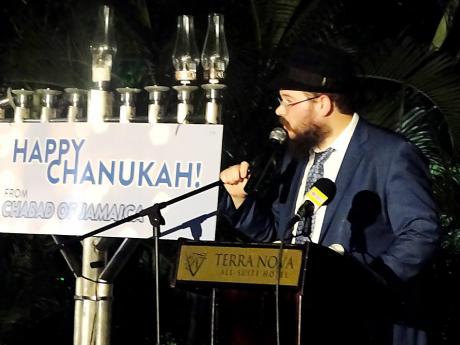Happy Chanukah!
From December 2-9, Jews all over the world are celebrating Chanukah, one of the biggest festivals on their calendar. According to them, "Chanukah is a lesson in life, perhaps the most important lesson you'll ever learn. Chanukah is the story of light defying darkness."
It is a story of redemption that started in Jerusalem, located in present-day Israel/Palestine, in 313 BCE, when Alexander the Great conquered and occupied the historic city. Under Greek rule, the Jews were allowed to exist peacefully.
When Antiochus III succeeded Alexander, the relative peace continued, until he was defeated by the Romans, and was forced to pay oppressive taxes, which he passed on to the citizens.
After Antiochus III died, his son, Seleuces IV, succeeded him. To pay the Romans taxes, Seleuces IV wanted to use all the money from the coffers of the Holy Temple. It was a time of great oppression, which intensified when he was killed and replaced by his tyrannical brother, Antiochus Epiphanes.
Many Jews were influenced by Greek cultural practices and embraced secular lifestyles and behaviour, including idolatry and self-worshipping. Epiphanes loved this and encouraged the spread of the Greek culture as a way of unifying his kingdom.
Some of the main Jewish religious practices, such as Sabbath (Shabbat) and circumcision, were banned. One of the greatest insults to the Jews, the slaughtering of pigs on the altar of the Holy Temple, was committed. Also, Epiphanes removed the Jewish high priest, Yochanan, and replaced him with a secular Jew called Jason.
Understandably, there were oppositions to Epiphanes' actions, and many of those who stood up against him were killed. A widespread riot was provoked when Epiphanes erected monuments of the mythical Greek god, Zeus, to be worshipped by one and all. It was a time when the Jews had to go deep into their resolve to protect their religion.
FIERCE BATTLES
They formed a small army that called itself the Maccabees, led by Matityahu and his five sons. They were said to have come from the Hasmonean dynasty. The army they formed was outmatched by the most powerful force in the world at the time, but into battle they went. The Maccabees had some early victories, forcing the Greek to retreat and return with more men and armoured elephants.
There were many fierce battles, and the Maccabees were surprisingly winning most of them. The story is told of a woman named Yehudit, who infiltrated the base camp run by the Greeks and the Syrians. She seduced the general and dazed him with wine and cheese. She then killed him with his own sword. In the end the Maccabees won the war, which left Jerusalem in a shambles.
The Holy Temple was desecrated, and was replete with various idols, forbidden foods and broken pottery. The Jews had no choice than to tidy it up and rededicate it, but the lights of the Menorah, one of the oldest symbols of Judaism, were extinguished and the Greeks had contaminated the olive oil left in the temple.
New, uncontaminated oil was needed, and it would have taken seven days to get some from the supplier, the orchards of Tekoah. That would have been too long for the Maccabees. Fortunately, they found a jug of perfect olive oil that was hidden below the temple's floor.
The oil was supposed to last for one night, but for some reason it lasted for eight days. This phenomenon was regarded a miracle, and Chanukah has come to mean the victory of light over darkness. It is celebrated with an eight-day festival of light, with the Chanukah Menorah, which commemorates the miracle of the Holy Temple Menorah burning for eight days, being at the heart of the celebrations.
Another practice at Chanukah is the giving of gelt (money) to children to teach them to be charitable and to do good deeds. The Jews said Chanukah gelt celebrates their freedom and "mandate to channel material wealth towards holy ends".
Gelt-giving is encouraged on each night of Chanukah, the most significant giving-night being the fifth, the first night when there are more flames than darkness. And since the miracle of Chanukah took place with the olive oil in the temple Menorah, oily foods such as doughnuts and potato latkes are a staple at Chanukah.


